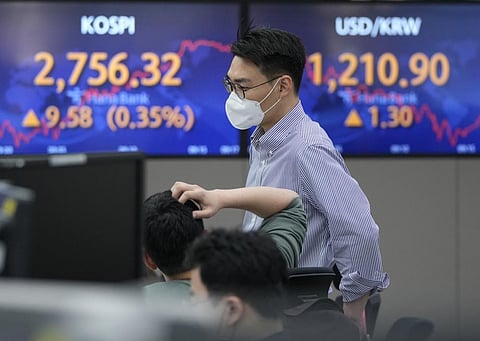

BEIJING: Global markets sank Thursday after Chinese manufacturing weakened and Russian shelling around Ukraine’s capital shook hopes for progress in peace talks.
London, Shanghai, Paris and Tokyo declined while Frankfurt opened higher.
Oil fell almost $5 per barrel in New York but stayed above $100 following reports President Joe Biden would release U.S. reserves to cool surging prices amid anxiety about possible disruption to Russian supplies.
OPEC and allied oil producers including Russia will be deciding Thursday how much crude to pump to the world. Analysts expect the group, known as OPEC+, to stay on its schedule of gradual increases to restore production cuts made during the depths of the coronavirus pandemic in 2020.
Russian forces were shelling areas near Kyiv and another city after Moscow said it would scale back operations there to promote trust. Virtual talks on trying to end the five-week-old war are expected Friday.
Russia is “pouring cold water on headlines of constructive cease-fire talks,” Stephen Innes of SPI Asset Management said in a report.
In early trading, London’s FTSE 100 lost less than 0.1% to 7,575.04 while Frankfurt’s DAX added 0.1% to 7,578.75. The CAC 40 in Paris shed less than 0.1% to 6,743.19.
On Wall Street, the future for the benchmark S&P 500 index was 0.2% higher a day after falling on weaker-than-forecast U.S. economic growth. The future for the Dow industrials was virtually unchanged.
In Asia, the Shanghai Composite Index lost 0.4% to 3,252.20 after an index of Chinese manufacturing activit y fell to a five-month low following the shutdown of much of Shanghai and two smaller industrial cities to fight coronavirus outbreaks.
The Hang Seng in Hong Kong sank 1.1% to 21,996.85.
“The near-term outlook remains highly uncertain,” Julian Evans-Pritchard of Capital Economics said in a report. “Even if the outbreak is brought under control soon, it will still take a while for the economy to get back on track.”
The Nikkei 225 in Tokyo shed 0.7% to 27,821.43 and Sydney’s S&P-ASX 200 lost 0.2% to 7,499.60.
The Kospi in Seoul gained 0.4% to 2,757.65 after data showed February industrial production improved.
India’s Sensex shed 0.2% to 58,560.02. New Zealand and Jakarta gained while Singapore and Bangkok declined.
On Wednesday, the S&P 500 declined 0.6% after Commerce Department data showed the U.S. economy grew at an annual pace of 6.9% in the final quarter of 2021.
The Dow Jones Industrial Average slipped 0.2% and the Nasdaq composite lost 1.2%.
Markets have mostly gained ground this week as talks between Russia and Ukraine seemed to show progress.
Investors already were worried about higher U.S. interest rates and a Chinese economic slowdown.
On Thursday, the Commerce Department is due to release its personal income and spending report for February. The Labor Department will release U.S. employment data for March on Friday.
Benchmark U.S. crude tumbled $4.98 to $102.84 per barrel in electronic trading on the New York Mercantile Exchange. It was down more than $7 at one point. The contract rose $3.58 on Wednesday to $107.82.
Brent crude, the price basis for international oil trading, fell $4.21 to $107.23 per barrel in London.
Biden is preparing to order the release of up to 1 million barrels of oil per day from U.S. reserves, according to two people familiar with the decision. That would come near to closing the U.S. production gap compared with February 2020 before the coronavirus caused a steep decline.
However, that supply is “simply not enough to offset Russian losses,” Francesco Pesole and Frantisek Taborsky of ING said in a report. “It does not seem likely that U.S. reserves will be able to drive oil prices structurally lower.”
The dollar advanced to 121.97 yen from Wednesday’s 121.78 yen. The euro declined to $1.1123 from $1.1159.